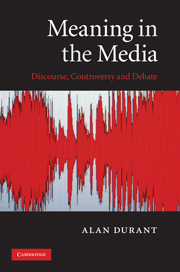Book contents
- Frontmatter
- Contents
- Acknowledgements
- Introduction
- Part I Communication failure and interpretive conflict
- Part II Making sense of ‘meaning’
- Part III Verbal disputes and approaches to resolving them
- Part IV Analysing disputes in different fields of law and regulation
- 9 Defamation: ‘reasonably capable of bearing the meaning attributed’
- 10 Advertising: ‘not only what is said, but what is reasonably implied’
- 11 Offensiveness: ‘If there is a meaning, it is doubtless objectionable’
- Part V Conclusion
- References
- Index
9 - Defamation: ‘reasonably capable of bearing the meaning attributed’
Published online by Cambridge University Press: 05 June 2012
- Frontmatter
- Contents
- Acknowledgements
- Introduction
- Part I Communication failure and interpretive conflict
- Part II Making sense of ‘meaning’
- Part III Verbal disputes and approaches to resolving them
- Part IV Analysing disputes in different fields of law and regulation
- 9 Defamation: ‘reasonably capable of bearing the meaning attributed’
- 10 Advertising: ‘not only what is said, but what is reasonably implied’
- 11 Offensiveness: ‘If there is a meaning, it is doubtless objectionable’
- Part V Conclusion
- References
- Index
Summary
Introduction
Chapters 9–11 examine meaning in three areas of media law and regulation in greater detail. In the first of these three chapters, I look at one specific legal cause of action, defamation. I relate arguments about meaning presented earlier in the book to the challenge of deciding what utterances or texts mean in this field of law. Publications or media coverage alleged to be damaging to reputation, I show, are considered in terms of whether they warrant the meaning or meanings pleaded by the complainant to an ‘ordinary reader’ standard of meaning. Where publication was to an audience likely to be split in terms of relevant knowledge available to it, a further notion, that of legal ‘innuendo’ meaning, is invoked. I focus on the boundary between these two notions of meaning: between the ‘natural and ordinary meaning of the words’ available to an ordinary reader and the specialised kind of meaning associated with particular knowledge available only to a given, segmented readership. This distinction between ‘innuendo’ meaning and ‘ordinary-reader’ meaning, I argue, shows up wider problems in how meanings are ascribed and evaluated in defamation.
Libel and the meaning of words
When people involved in a libel action discuss defamation, the ‘-ing’ word they use most is not ‘meaning’ but ‘winning’. Yet despite defamation's lustre of gladiatorial struggle and gold, the protection extended to reputation by this area of law depends crucially on attributions of meaning.
- Type
- Chapter
- Information
- Meaning in the MediaDiscourse, Controversy and Debate, pp. 147 - 173Publisher: Cambridge University PressPrint publication year: 2010



